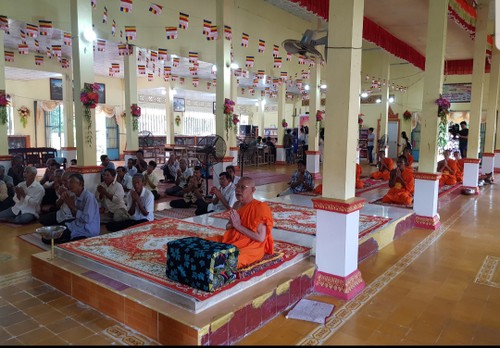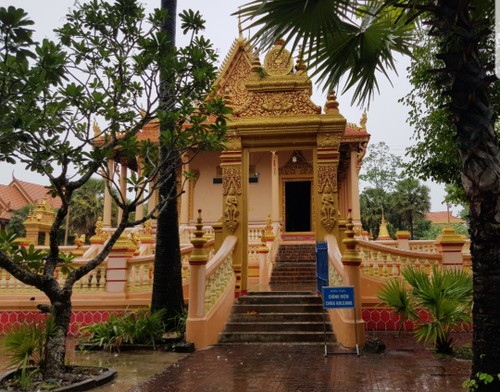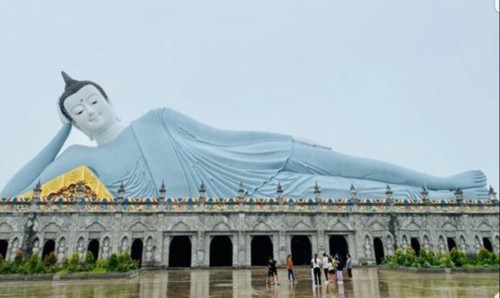 A religious gathering at Prey Chop pagoda in Soc Trang province. (Photo: Ngoc Anh) A religious gathering at Prey Chop pagoda in Soc Trang province. (Photo: Ngoc Anh) |
Soc Trang province has 9 religions that have been recognized by the State including Buddhism, Catholicism, Protestantism, Caodaism, and Hoa Hao Buddhism.
Lieutenant Colonel Nguyen Van Tuan, deputy head of the homeland security section of the provincial police, said that Soc Trang is home to 92 pagodas, 364,000 Buddhists, and 1,700 monks of the three ethnic groups of Kinh, Khmer, and Chinese, who are in harmony with each other, united, and don’t suffer from any discrimination or conflict.
“Despite hostile forces’ plots and maneuvers of the so-called "peaceful evolution" to establish a self-governing Khmer Krom State in the Southwest, a majority of ethnic people believe in Party guidelines and State policies,” said Tuan.
 The main hall of Kh'Leang pagoda in Soc Trang province. (Photo: Ngoc Anh) The main hall of Kh'Leang pagoda in Soc Trang province. (Photo: Ngoc Anh) |
The provincial administration has supported the locals in practicing their religion and has opened management training classes for hundreds of monks and dignitaries.
Support has also been given to mobilizing social resources to restore and repair worship facilities and preserve and promote the traditional festivals of ethnic minorities.
Religious dignitaries have been given opportunities to participate in social activities and mass organizations, said Ly Rotha, head of the provincial Committee for Ethnic Minority Affairs.
He told VOV that they organize an annual meeting with religious dignitaries to update them on Party guidelines and State policies and to hear their thoughts and aspirations in order to find timely solutions to their issues.
“Over the years, the Soc Trang administration has promoted freedom of religion and belief, making sure that pagoda festivals, for example, are well organized to inspire people. Local Khmer ethnic people have strictly complied with Party guidelines and State policies. All three ethnic groups in the locality - Kinh, Khmer, and Chinese - live in harmony,” said Ly Rotha.
The dissemination of Party guidelines and State policies, particularly the Law on Belief and Religion, has focused on areas with a large number of religious followers to warn them of disinformation.
Religious followers, like everyone else, should abide by the State laws, said Ly Bon, a Khmer person who lives near Ta Mon pagoda.
“Local authorities have always protected beliefs and religions, not only at Ta Mon Pagoda, but at all pagodas,” said Ly Bon, adding, “Buddhists have the right to believe, live, and work in accordance with the State and with Buddhism. Pagoda heads always try to help Buddhist followers do business and improve their economy, and tell them to live a good life.”
Most Venerable Tran Van Tha, head of Ta Mon pagoda, says the pagoda creates favorable conditions for Buddhists to perform religious activities and has a great influence on the locals.
 Som Rong pagoda’s reclining Buddha statue. (Photo: Ngoc Anh) Som Rong pagoda’s reclining Buddha statue. (Photo: Ngoc Anh) |
The Ta Mon pagoda chief says throughout their life Khmer people are attached to a pagoda, which is a place, not just for religious activities, but also for cultural activities.
“The Party and State have promulgated many policies to support pagodas. The monks who already study Pali teachings can continue their studies at the Southern Pali Culture Training School in Soc Trang province. Those monks who qualify can continue to study at the Khmer Theravada Buddhist Institute in Can Tho city, or go abroad to Thailand, Myanmar, or Sri Lanka for further study,” said Most Venerable Tran Van Tha.
Soc Trang province has been coordinating measures to ensure freedom of religion and belief for ethnic minority groups, and religious organizations are encouraged to unite and operate in a way that serves the nation.